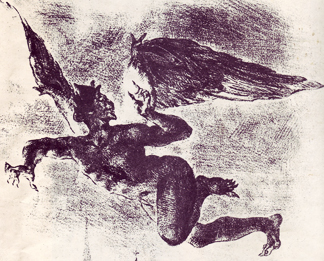Share |
Music: Mythical Elements in Works for the Musical Stage: The Outsider
By Frank Behrens
ART TIMES January/ February 2012
 The Original Outsider as Pictured in the Middle Ages The Original Outsider as Pictured in the Middle Ages |
Having considered so far the Unknown Son of a God (or equivalent) and the trickster, we come to one last (for now) major mythical element: the Judas figure. Researchers have found that happy events in pre-historic Greece were interrupted by an Outsider, an Ill-Wisher. (This character is called an “alazon” by Wylie Sypher in his book “Comedy.”) It was his purpose to shout curses at the happy couple or newly instituted king, or fertility rituals to assure the next crop. A sort of pre-historic Scrooge. But the real purpose was to keep the gods from becoming envious of the happy humans.
This figure is most familiar in Shakespeare’s comedies. There is the aptly named Malvolio in “Twelfth Night,” the vile Thersites in “Troilus and Cressida,” the cynical Jacques in “As You Like It,” and the loud-mouth critic Lucio in “Measure for Measure.” Of them and all the rest like them, only Jacques leaves them peacefully, in this case to find a “convertite” from whom “there is much matter to be heard and learn’d” [Act 5]. Malvolio leaves, swearing vengeance. And Lucio is “married to a punk.”
So let us start with “Oklahoma!” (yes, seriously), the plot of which centers around the question of which man will bring Laurie to the picnic. The “good suitor” (i.e., the one who will marry and produce new life) is Curly, young and vital. The “bad” one is Jud Fry, whose overly symbolic name is 3/5 of Judas and what one will do in Hell. Whether or not Jud really loves or merely lusts for Laurie is beside the point.
Act I, scene 1 contains Jud’s soliloquy “Lonesome room,” a very important insight into his character and one usually cut from productions, because (1) they can’t find a good actor who can also sing or (2) it breaks the light mood of the show. In re the second reason, the director implies that Rodgers and Hammerstein didn’t know how to write a play. There is no room here to quote the lyrics, but the loneliness of this alazon seems to be the strongest motivation for Jud’s evil acts.
Even when Jud joins Curly in a very comic number, “Poor Jud is dead,” the theme is still death. In fact, I am hard pressed to think of any other musical comedy or comic opera in which a character actually dies. Oh yes, in “Gianni Schicchi” Buono has died before the opera begins, so that doesn’t count. And no, Jack Point “falls insensible,” not dead, at the final curtain of “The Yeomen of the Guard.”
Okay. Roberta in “Roberta” does die on stage; but it is from natural causes.
The love between Porgy and Bess is thwarted by two villains. There is Crown, who has claims Bess as his own property and whose death brings about the crisis to the plot. But more important is Sportin’ Life, possibly the slimiest of them all. Not only does he sell “happy dust” to the people of Catfish Row, not only does he mock the Bible’s tales that are so dear to those people, but he uses drugs to lure a defenseless Bess to go with him to New York. (This is NOT a musical comedy by any means.) It is quite clear that Porgy, who had killed Crown, will kill himself in the hopeless task of going to New York on his goat cart. (The “happy ending” provided in the recent production—better, perversion—of this great work notwithstanding.)
Of course, the Ultimate Outsider is the Devil himself. He is called Applegate in “DamnYankees.” (How I love these names!) Here the Apple of Temptation and the Gate to Hell uses as his double bait the Senators winning World Series and then Lola to tempt Joe Hardy from home and loving wife. That Applegate should fail is simply part of a long tradition in tales like this: Goodness will always triumph.
Now, “Oklahoma!” was based on a play called “Green Grow the Lilacs” by Lynn Riggs, but that work itself was a musical. “Porgy and Bess” was based on a play (“Porgy” by DuBose and Dorothy Heyward) that itself was based on DuBose’s novel. And “Damn Yankees” was based on a novel by Douglass Wallop. Still it is the finished musical products that we have and on those must we base our conclusions.
A neat twist on all this is J. Pierpont Finch in “How to Succeed in Business Without Really Trying.” This musical is based on a satirical manual of the same name by Shepherd Mead. In this play, Finch himself is both the Trickster and the Outsider who rises to the top, a sort of lovable alazon. But the plot needs a character to keep even Finch from happiness; and so Bud Frump, the egomaniacal nephew of the Boss, was invented. Thwarted himself at the end of the first half of the show, he exits declaring, “I shall return.” In the second half, he returns nastier than ever and declares, “I have returned.” (Is it a coincidence that “Bud Frump” is so close to “Jud Fry”?)
Finch finds love and is redeemed. Frump remains the “company man.” And thus do we have a Madison Avenue Mythos for our Modern Times.
